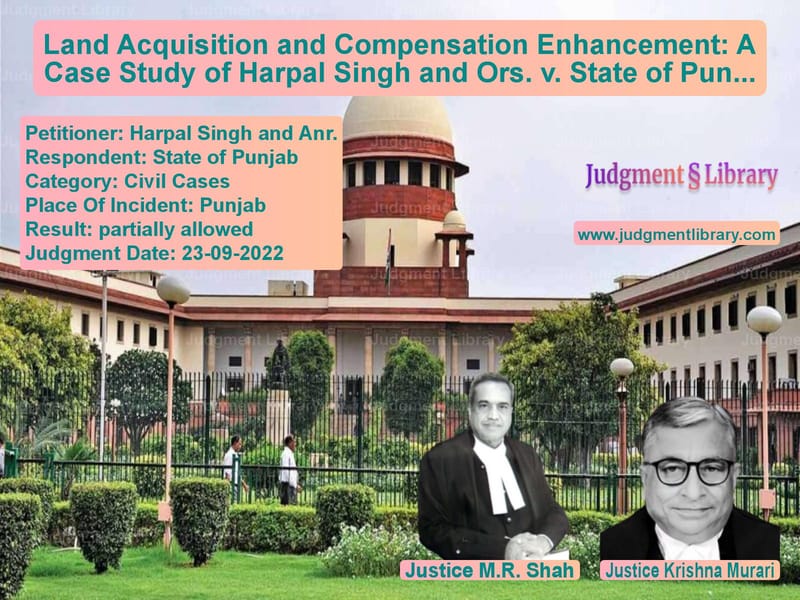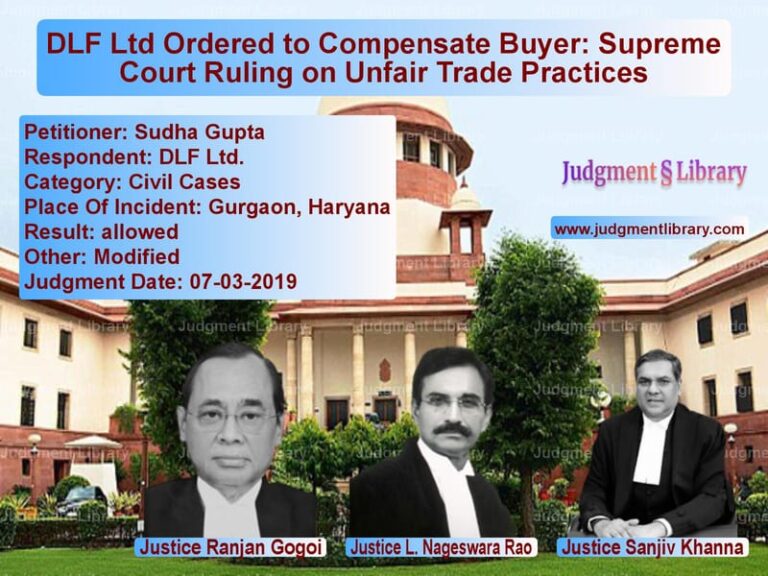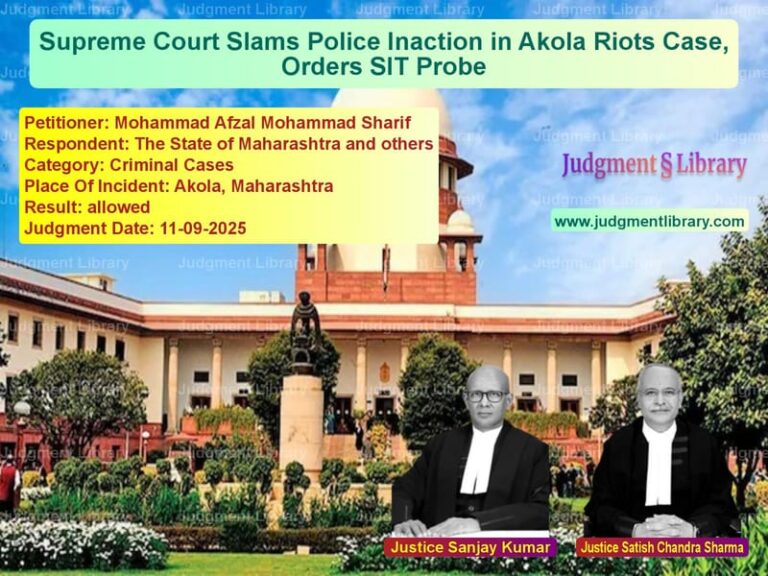Land Acquisition and Compensation Enhancement: A Case Study of Harpal Singh and Ors. v. State of Punjab
The case of Harpal Singh and Anr. v. State of Punjab deals with the compensation determination for land acquired for public purposes. The petitioners, landowners, challenged the compensation awarded by the Punjab High Court under the Land Acquisition Act, 1894. The issue of fair compensation, as well as the statutory benefits related to interest on enhanced compensation, was raised in the appeal. The judgment provides an in-depth look into the procedures followed in land acquisition cases and the judicial mechanisms that allow for the enhancement of compensation after appeals. The Supreme Court in its ruling enhanced the compensation for the landowners and provided specific directives regarding interest and solatium. This blog post analyzes the arguments presented by both the petitioners and respondents, the Court’s reasoning, and the final decision passed in this significant land acquisition case.
Background of the Case
The appeal involves a group of landowners from the Greater Mohali Area Development Authority (GMADA), who contested the compensation awarded by the Punjab High Court. The compensation for their acquired land was initially determined by the government at a rate of Rs. 19,85,700 per acre. However, the landowners argued that this amount was insufficient and did not account for the true market value of the land. The High Court had relied on its previous judgments, particularly the cases of Surjit Singh and Kapoor Singh, to determine the compensation. The landowners sought an enhancement of the compensation amount based on these precedents.
The petitioners, aggrieved by the decision of the High Court, filed appeals before the Supreme Court of India. The primary issue raised was whether the compensation for land acquired should be further enhanced and whether the statutory benefits such as interest on the enhanced compensation should apply from the date of the original High Court judgment.
Petitioner’s Arguments
The petitioners raised several arguments in favor of their claim for enhanced compensation:
- Inadequate Compensation: The petitioners argued that the compensation awarded by the Punjab High Court was inadequate and did not reflect the true market value of the land. They contended that the compensation should be enhanced based on the current market rates for land in the Greater Mohali area.
- Legal Precedents: The petitioners cited the decisions in the cases of Surjit Singh and Kapoor Singh, where the Supreme Court had earlier enhanced the compensation. They argued that the same principle should apply to their case, given the similarities in the land acquisition process.
- Fair and Just Compensation: The petitioners contended that the purpose of land acquisition is to ensure that the landowners are fairly compensated for the land acquired for public use. They argued that the compensation should be enhanced to reflect the actual loss suffered by the landowners due to the acquisition.
- Interest and Solatium: The petitioners also sought the statutory benefits, including interest and solatium, on the enhanced compensation. They argued that the delay in the appeal process should not prejudice them, and the enhanced compensation should be paid along with the interest from the date of the High Court’s decision.
Respondent’s Arguments
The State of Punjab, represented by the respondents, presented the following counterarguments:
- Compensation Based on Market Rates: The respondents argued that the compensation was determined in accordance with the market rates at the time of the land acquisition. They emphasized that the amount offered was fair and had been computed based on the prevailing market conditions and the land’s classification.
- Finality of the High Court’s Decision: The respondents contended that the High Court had already reviewed the compensation and had issued a fair and final order. They argued that there was no need for further enhancement, as the compensation was justifiable based on the legal and factual circumstances.
- Delay in Appeal: The respondents pointed out that the landowners had delayed filing their appeals, which had contributed to the prolonged litigation. They contended that the petitioners should not be entitled to statutory benefits such as interest on the enhanced compensation due to this delay.
- Statutory Guidelines for Compensation: The respondents also highlighted that the compensation amount was determined according to the statutory guidelines provided under the Land Acquisition Act, and any further enhancement beyond the provisions of the Act would be unjustified.
The Court’s Reasoning
The Supreme Court, after considering the submissions from both parties, examined the case based on the principles of fair compensation for land acquisition and the statutory provisions under the Land Acquisition Act. The Court made the following observations:
- Fair Compensation and Market Value: The Court agreed with the petitioners’ contention that the compensation awarded by the Punjab High Court was inadequate and did not reflect the true market value of the land. The Court referred to the previous rulings in the cases of Surjit Singh and Kapoor Singh, where the compensation was enhanced to ensure fair and just compensation to landowners.
- Principle of Enhancing Compensation: The Court emphasized that the principle of enhancing compensation in land acquisition cases is essential to provide landowners with a fair value for their property. The Court observed that the market conditions had changed significantly since the original compensation was determined, and the enhanced compensation should reflect this change.
- Legal Precedents and Application: The Court observed that the decisions in Surjit Singh and Kapoor Singh had set a precedent for enhancing compensation in similar land acquisition cases. The Court reiterated the importance of following these precedents to ensure consistency in the legal approach to compensation.
- Interest and Solatium: The Court agreed with the petitioners’ claim for interest and solatium on the enhanced compensation. However, the Court noted that due to the delay in filing the appeal, the statutory benefits, including interest, would be applicable only from the date the appeals were filed before the Supreme Court.
- Delay and Prejudice: The Court acknowledged the delay in filing the appeals but held that it would not affect the landowners’ entitlement to enhanced compensation. The Court held that the delay did not justify denying the petitioners their rightful share of enhanced compensation.
The Court’s Decision
The Supreme Court made the following orders:
- Enhancement of Compensation: The Court directed the enhancement of compensation payable to the landowners by Rs. 1,00,000 per acre in the case of Civil Appeal arising out of RFA No. 1614 of 2000 and by Rs. 2,00,000 per acre in the remaining appeals. This enhancement was in line with the previous rulings in Surjit Singh and Kapoor Singh.
- Statutory Benefits: The Court ordered that the enhanced compensation be paid along with solatium and interest, as prescribed under the statutory provisions. However, the Court held that the statutory benefits, including interest, would not apply from the date of the High Court’s decision but would only be applicable from the date the appeals were filed in the Supreme Court.
- Deposit of Compensation: The Court directed the Greater Mohali Area Development Authority to deposit the enhanced compensation with the Reference Court within three months from the date of the judgment.
- No Costs: The Court made no order as to costs, recognizing the complexities involved in the case and the interests of justice.
Conclusion
This case highlights the importance of fair and just compensation in land acquisition matters. The Supreme Court’s decision ensures that landowners are compensated fairly for their land, reflecting the true market value and the changes in market conditions. The case also reiterates the significance of judicial precedents in determining compensation and the need for timely appeals in ensuring that landowners receive the full benefits of statutory provisions such as solatium and interest on enhanced compensation. The ruling provides clarity on the application of compensation enhancements and the rights of landowners in land acquisition cases.
Read also: https://judgmentlibrary.com/unregistered-agreement-to-sell-supreme-court-rules-on-property-dispute/
Petitioner Name: Harpal Singh and Anr..Respondent Name: State of Punjab.Judgment By: Justice M.R. Shah, Justice Krishna Murari.Place Of Incident: Punjab.Judgment Date: 23-09-2022.
Don’t miss out on the full details! Download the complete judgment in PDF format below and gain valuable insights instantly!
Download Judgment: harpal-singh-and-anr-vs-state-of-punjab-supreme-court-of-india-judgment-dated-23-09-2022.pdf
Directly Download Judgment: Directly download this Judgment
See all petitions in Contract Disputes
See all petitions in Property Disputes
See all petitions in Damages and Compensation
See all petitions in Specific Performance
See all petitions in Judgment by Mukeshkumar Rasikbhai Shah
See all petitions in Judgment by Krishna Murari
See all petitions in partially allowed
See all petitions in supreme court of India judgments September 2022
See all petitions in 2022 judgments
See all posts in Civil Cases Category
See all allowed petitions in Civil Cases Category
See all Dismissed petitions in Civil Cases Category
See all partially allowed petitions in Civil Cases Category







